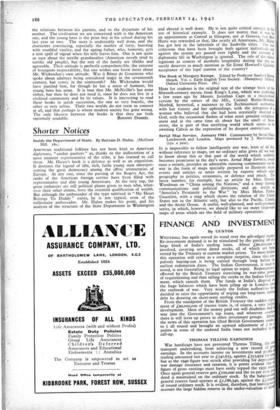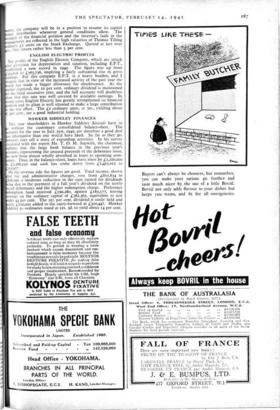FINANCE AND INVESTMENT
By CUSTOS
WHITEHALL has again waved its wand over the gilt-edged market Re-investment demand is to be stimulated by the paying off of large block of India's sterling loans. About L90,000,000 5 involved, covering seven dated stocks, all of which are berg vested by the Treasury at current market prices. To most hales this operation will come as a complete surprise, since this com- pulsory buying-out is being carried through long before tilt earliest redemption dates. The Indian Government, it must 15 noted, is not forestalling its legal option to repay. Redemption5 effected by the British Treasury exercising its war-time power of requisitioning and then selling the stocks to the Indian Govern. ment, which cancels them. The funds at India's disposal art the huge balances which have been piling up in London siO the outbreak of war. Very wisely the Indian authorities hart decided to seize the opportunity of wiping out long-term sterla debt by drawing on short-term sterling credits. WHITEHALL has again waved its wand over the gilt-edged market Re-investment demand is to be stimulated by the paying off of large block of India's sterling loans. About L90,000,000 5 involved, covering seven dated stocks, all of which are berg vested by the Treasury at current market prices. To most hales this operation will come as a complete surprise, since this com- pulsory buying-out is being carried through long before tilt earliest redemption dates. The Indian Government, it must 15 noted, is not forestalling its legal option to repay. Redemption5 effected by the British Treasury exercising its war-time power of requisitioning and then selling the stocks to the Indian Govern. ment, which cancels them. The funds at India's disposal art the huge balances which have been piling up in London siO the outbreak of war. Very wisely the Indian authorities hart decided to seize the opportunity of wiping out long-term sterla debt by drawing on short-term sterling credits. From the standpoint of the British Treasury the sudden repa, ment of L90,000,00o of trustee loans is, of course, a very helpfd development. Most of the money paid out will doubtless find way into the Government's tap loans, and whatever ove there is will lever up prices in other investment groups. Algol the news of this operation has lifted British Government staid to all round and brought an upward adjustment of 2 to si points in some of the undated India loans not included 111 call-up.
THOMAS TILLING EARNINGS
War handicaps have not prevented Thomas Tilling, the transport undertaking, from achieving a new record of earnings. In the accounts income on investments and profits trading amounted last year to £541,633, against £553,919 for 19 but as the 1940 figure was struck after providing for depreciate war damage insurance and taxation, it is pretty evident that figure of gross earnings must have easily topped the 1939 re Once again general reserve gets £xoo,000 and the to per cent. di dend is maintained on the ordinary stock. In the balance-s general reserve fund appears at £1,186,340, against the £4,12 of issued ordinary stock. It is evident, therefore, that leaving a account the large hidden reserve in the under-valuation of in nts, the company will be in a position to resume its capital nus distribution whenever general conditions allow. The trength of the financial position and the investor's faith in the anagement are reflected in the high valuation of Thomas Tilling dinary Li units on the Stock Exchange. Quoted at just over , they return rather less than 5 per cent.
ENGLISH ELECTRIC PROFITS Net profits of the English Electric Company, which are struck ter provision for depreciation and taxation, including E.P.T., ablished a new record in 194o. The figure was up from 355,656 to £363,736, implying a fairly substantial rise in gross ings. For this company E.P.T. is a heavy burden, and I agine that in view of the increased activity of the past year the and has made a bigger allowance for obsolescence. As the arket expected, the to per cent, ordinary dividend is maintained the third successive year, and the full accounts will doubtless ow that this rate was well covered by available earnings. In cent years English Electric has greatly strengthened its financial sition and its plant is well situated to make a large contribution the war effort. The Li ordinary units, at 3os., yielding about per cent., are a good industrial holding.
HAWKER SIDDELEY FINANCES
This year -shareholders in Hawker Siddeley Aircraft have to o without the customary consolidated balance-sheet. The ounts for the year to July 31st, 1940, are therefore a good deal ss informative than one would have liked. So far as they go, owever, they tell a story of expanding activities. In his survey culated with the report Mr. T. 0. M. Sopwith, the chairman, 'plains that the large bank balance in the previous year's counts, representing the unused proceeds of the debenture issue, as now been almost wholly absorbed in loans to operating corn- anies. Thus, in the balance-sheet, loans have risen by £1,200,000 £3,386,250 and cash has come down from L1,425,o12 CO 113.977- On the revenue side the figures are good. Total income, shown fter tax and administrative charges, rose from £811,834 to 818,196, a moderate reduction in the sum earned for dividends ing due to the payment of a full year's dividend on the newly cued debentures and the higher redemption charge. Preference demption fund received £190,280, against £183,577, leaving amings on the ordinary capital of £382,365, equivalent to just der 44 per cent. The 32-1- per cent, dividend is easily held and any Ltoo,000 added to the carry-forward at £320,447. Hawker iddeley 5s. ordinaries stand at I2S. 3d. to yield about 14 per cent.































 Previous page
Previous page